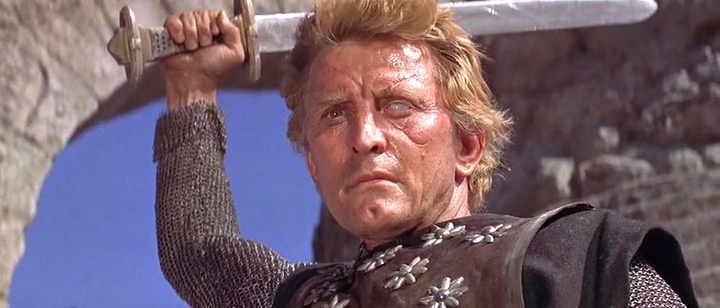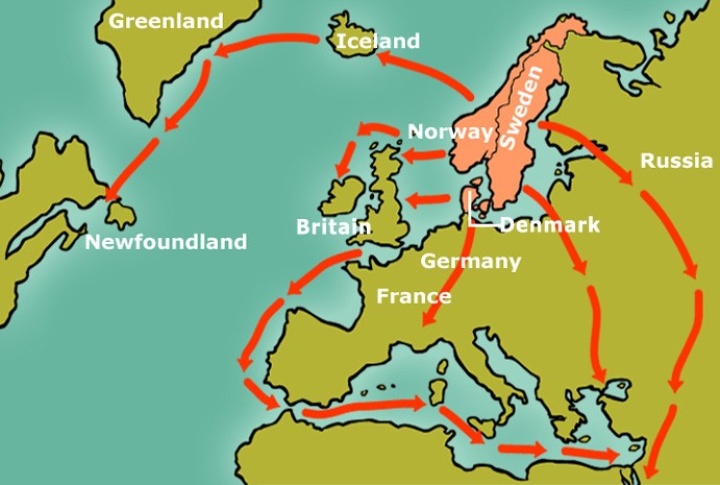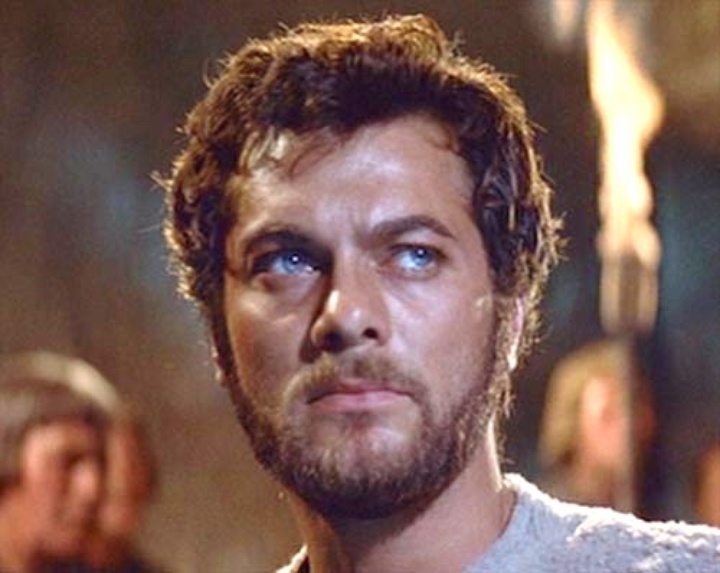My love affair with the Vikings began in 1958. Kirk Douglas couldn’t get a regular studio to back his childhood dream of a Nordic swords-and-sandals flick, so he took it on as a pet project, filming in Norway with camera and production crews from all over Europe. Plus Tony Curtis (with beard), Janet Leigh, Ernest Borgnine and, of course, his dimpled self. The result was The Vikings — corny story, awesome locations, great movie.

Kirk Douglas as Einar (Fair use).
Well of course the plot was corny! (“A slave and a Viking prince fight for the love of a captive princess.”—IMBd.) It was based on an actual saga, that of Ragnar Lothbrok, written about 800 years ago, all about honor and revenge, family feuds and jealous gods, Valhalla and Helheim—Boy’s Own stuff, it’s right up there with Gilgamesh, Homer’s tales and King Arthur. The heck with subtlety. These tales were the soap operas of the medieval world, told and re-told around smoky firesides. My sort of stories.

Ragnar Lodbrok, executed by being thrown into a pit of snakes. Marginally better than the Blood Eagle ritual. (Yolanda Perera S’nchez/Alamy)
Read any popular account of the Vikings—the real ones, the raiding-and-trading Norse seafarers who practically owned Europe for around 300 years from 770 AD on — and you’ll soon encounter historical schizophrenia. These guys (the Vikings, not the historians) were heartless pillagers, plunderers and worse, who terrorized any community reachable by a Viking longship. “Deliver us, O Lord, from the wrath of the Northmen” was right up there with the Lord’s Prayer in churches from Scotland to Sicily. But they were also traders, entrepreneurs and settlers. I’m no expert (in anything), but my reading is that the Vikings were responsible for the economic revival of Europe, which badly needed a boost following the collapse of the Roman Empire in the West. Their influence lives on today. For instance:
- They founded the independent state of Normandy, in northwest France, in 911. A century-and-a-half later, Normans invaded Britain (1066 and all that), latinizing the English language and establishing a strong government and economy which lasted nearly a thousand years. Until last June’s Brexit vote.
- Calling themselves the “Rus,” Vikings founded the first Russian state, based in Kiev. Via several accidents of history, the long-term result of this was to bring Byzantine (from Constantinople) architecture, alphabet (Cyrillic) and religion (Eastern Orthodox) to Russia.
- They colonized Iceland (permanently) and Greenland (temporarily) and briefly settled the shores of Newfoundland. Sailing and rowing without compasses, they were the most adept long-distance navigators anytime, anywhere.
- Reacting to Viking raids, European kings focused and strengthened their domains, hardening boundaries that have largely remained in place to the present time.
- They internationalized the world, making it a smaller place by connecting people from Baghdad to Morroco to Scandinavia to North America. A typical Viking ship was manned by slaves from all over: Italy, Russia, Spain, England, France. A Viking camp would have been a United Nations of humanity.

The extent of Viking voyages.
I’m told a Canadian-Irish “Vikings” series is currently being shown on The History Channel. I plan on avoiding it. I’d only start making invidious comparisons, and there would go my love affair as I started to worry whether they really did wear those cool horned helmets.

Fair use.
###
Barry Evans gave the best years of his life to civil engineering, and what thanks did he get? In his dotage, he travels, kayaks, meditates and writes for the Journal and the Humboldt Historian. He sucks at 8 Ball. Buy his Field Notes anthologies at any local bookstore. Please.
CLICK TO MANAGE